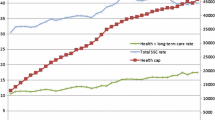Abstract
We indicate that financial crisis in social security programs might be endogenous because social security affects fertility and human capital's decisions and thus, the aggregate growth rate of the economy. These effects lead to an endogenous erosion of the financial basis of the PAYG social security program so that, as a consequence, the PAYG system is not sustainable and it requires continuous increases in the social security tax rate.
Similar content being viewed by others
Author information
Authors and Affiliations
Corresponding author
Additional information
I received helpful comments in an earlier version of this paper from G.S. Becker, Larry Sjaastad, two anonymous referees and participants at seminars at Pontificia Universidad Catolica de Chile and The University of Chicago. Remaining errors are my own responsibility.
Responsible editor: Junsen Zhang.
Rights and permissions
About this article
Cite this article
Cerda, R.A. On social security financial crisis. J Popul Econ 18, 509–517 (2005). https://doi.org/10.1007/s00148-005-0233-6
Received:
Accepted:
Issue Date:
DOI: https://doi.org/10.1007/s00148-005-0233-6




